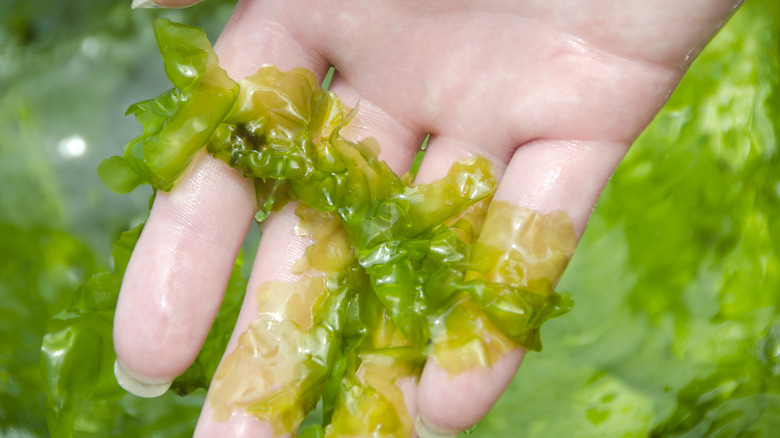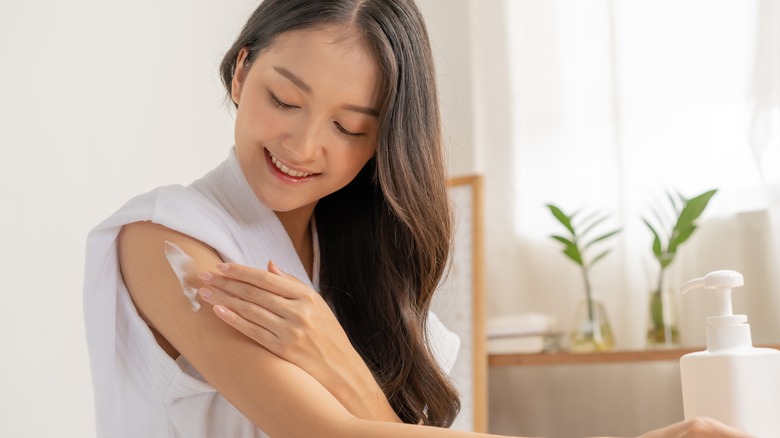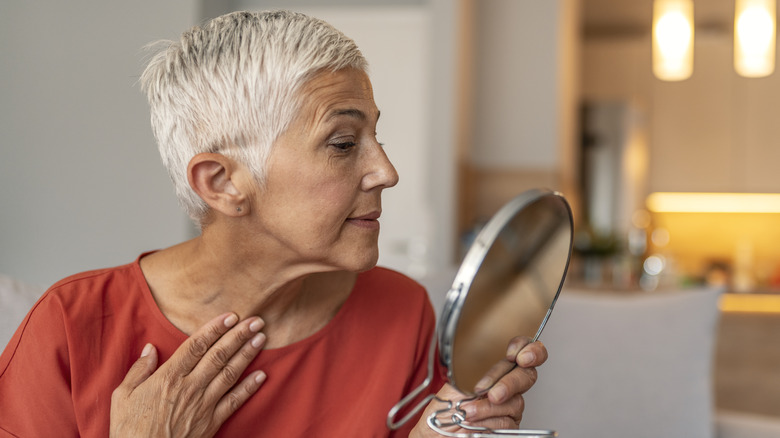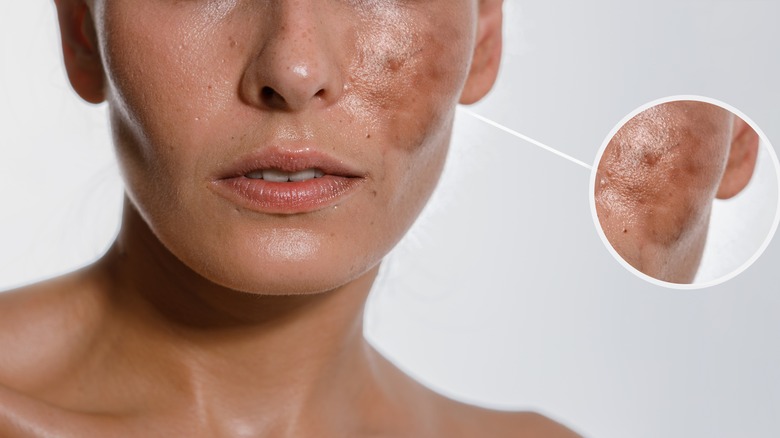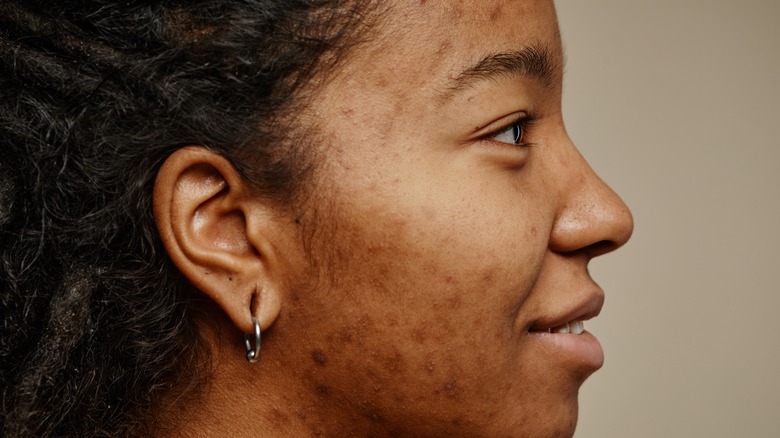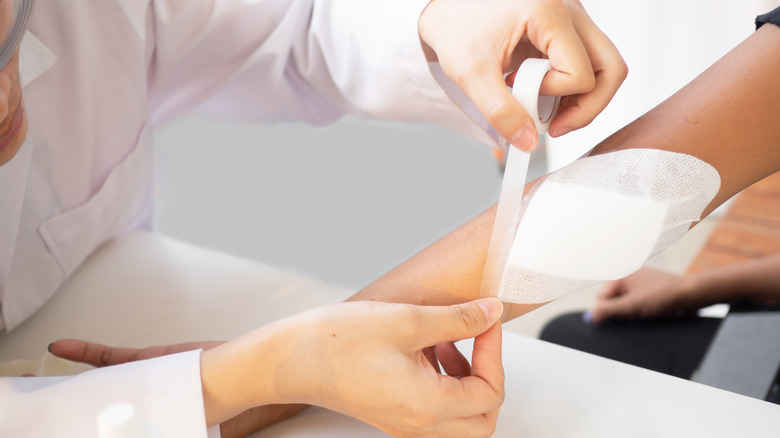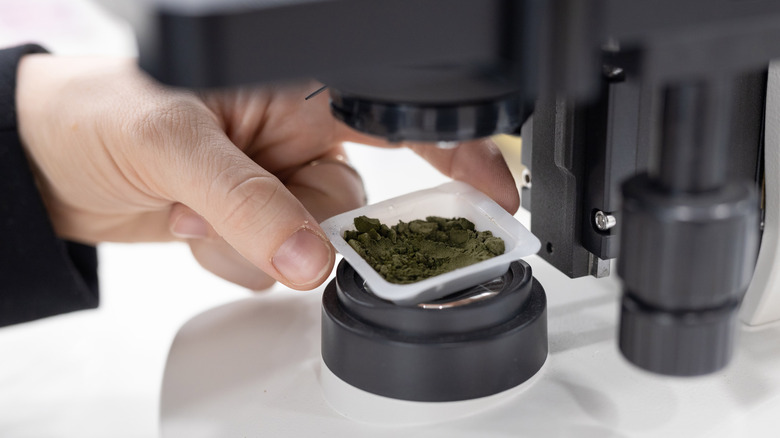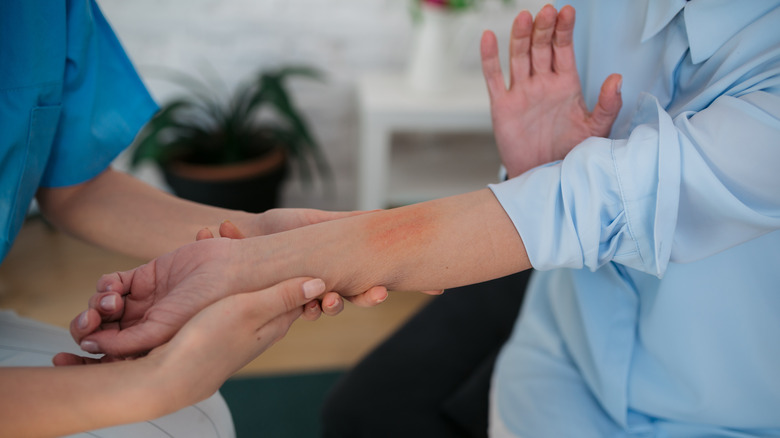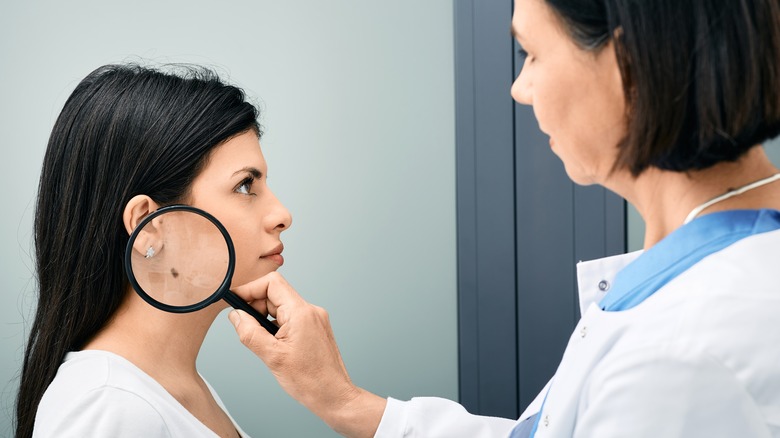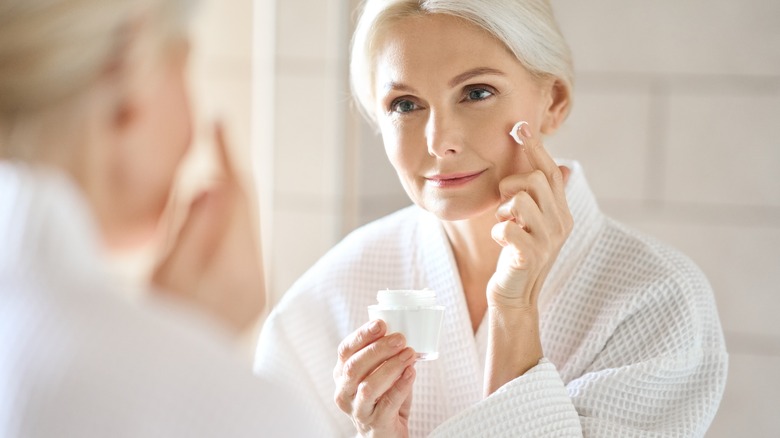Was Anyone Going To Tell Us Algae Is A Skincare Superhero?
You probably thought you wouldn't hear about algae outside biology class. Or maybe your knowledge of algae is limited to news of harmful or toxic species (which are really only a small subset). And, frankly, you might not be fond of algae if they've grown in your pool. There are actually many types of these water-loving creatures. You may be familiar with the large algae known as seaweed and products made from them. Other large species include brown, red, and green algae, but there are also microscopic algae known as microalgae. Most algae don't deserve a bad reputation but are actually superstars in water bodies.
Although they might not look that exceptional, algae brave the elements — ultraviolet rays, hot and cold temperatures, and salty water — all without drying out. They survive because of their unique structure as well as the beneficial substances they produce, including vitamins, proteins, and antioxidants (via this review, published in Marine Drugs).
Now, these substances can be extracted from algae and used in cosmetics to provide various benefits, depending on the type of algae being used. Additionally, algae are natural, safe, and less costly to produce than synthetic products, making them attractive to researchers and manufacturers in the cosmetic industry. So don't get eeked the next time you find algae listed as one of the constituents of your skin product. Find out what algae can actually do for your skin.
Moisturizes the skin
Generally, moisturizers contain three types of ingredients. First off, you have the humectants, which attract water to the surface of the skin. Then there are the emollients, which smoothen the skin and lock in some of the moisture from the humectants. But to really seal in that moisture, the occlusives come into play.
Some algal species are really good sources of humectants. For example, extracts of brown algae — the best sources of humectants among all algae, per a study published in Marine Drugs – may retain more moisture than hyaluronic acid (one of the best-known and most widely used humectants). This is because brown algae and even red and green algae contain polysaccharides in their cell walls, which have the ability to retain water when extracted and can thus be used as ingredients for moisturizing beauty products. The most studied polysaccharide is the fucoidan, which has good humectant properties as well as a lot of other benefits to the skin.
Minimizes fine lines and wrinkles
Why do we get wrinkles and fine lines in the first place? Wrinkling is linked with collagen and elastin, which are protein fibers produced naturally in the skin. These proteins are surrounded by ground substances. Together, they fill the skin and make it firm, flexible, and elastic.
Naturally, older proteins are degraded by enzymes like collagenases and elastases and replaced with newer proteins (via this review published in the Journal of Enzyme Inhibition and Medicinal Chemistry). If the rate at which the proteins are broken down exceeds that of their production, the skin wrinkles and sags. This is usually what happens when you age. On the other hand, protein turnover is more efficient when you are younger.
Per the review, extracts from algae like microalgae and blue-green algae are able to reduce the activity of these enzymes. Thus, they can maintain and improve skin filling and minimize the appearance of fine lines and wrinkles. Therefore, these algae are good candidates for anti-aging skin formulations like anti-aging face creams, masks, lotions, and body soaps.
Reduces skin hyperpigmentation
Melanin is a pigment produced in the skin by cells known as melanocytes. This pigment is responsible for your skin color, and it protects your skin from ultraviolet radiation. However, when there is an abnormal production of melanin in the skin, it causes hyperpigmentation, which is essentially the darkening of your skin. This could be due to sun exposure, melasma, freckles, moles, age spots, dark spots around the eye, lentigo, or other conditions. Hyperpigmentation can also be caused by drugs or cosmetics.
Notably, brown algae can be used to ameliorate skin hyperpigmentation in a more natural and safe way compared to synthetic products used as whitening agents. Brown algae are good sources of polyphenols, meroterpenoids, carotenoids, and polysaccharides like fucoidans (via this review published in Marine Drugs). These compounds work in various ways to reduce the production of melanin. Algae are unique because some specific components of these compounds can't be found among land plants. Hence extracts from algae can be really useful in getting rid of hyperpigmentation.
Protects from ultraviolet rays
Apart from causing sunburn and other forms of hyperpigmentation, ultraviolet (UV) rays damage the skin. The World Health Organization notes that long-term exposure to UV rays causes changes to skin cells, supporting structures, and blood vessels within the skin. Besides that, long-term UV exposure makes the skin dry, coarse, and wrinkled, which worsens the appearance of your skin as you age.
Algae are good sources of substances that can protect the skin from UV rays. Afterall, they produce these substances for their own benefit in order to withstand exposure to these rays. The substances include amino acids, polysaccharides, carotenoids, and polyphenols. They protect against UV exposure by absorbing the UV rays (via this review published in Marine Drugs). They are also good sources of antioxidants and are capable of regulating the immune system, among other activities. These substances also reduce skin wrinkling which could come from sun exposure. Therefore, extracts from algae can be added to skin care products to alleviate the effects of sun damage or help prevent it altogether. This doesn't mean you should swap your sunscreen for a product that contains algae, though.
Alleviates acne
Acne, which is known medically as acne vulgaris, is a common condition that affects adolescents and adults. It causes pimples, blackheads, and scars on the face, chest, and back. Apart from acne pimples being painful and causing discomfort, the scars they leave behind affect a person's appearance. Acne is the result of several factors, and it is usually influenced by hormonal imbalances which lead to an excessive production of sebum by the skin. Then the skin forms bumps due to blocked pores and an abnormal shedding of skin cells. In this state, the skin is prone to infections, especially bacterial ones. This triggers inflammation, which worsens acne (via this review published in Pharmaceutics).
Algae may not be able to correct hormonal imbalances, but they produce potent antibacterial and anti-inflammatory substances that can be useful in caring for acne. These substances include pigments, fatty acids, proteins, polysaccharides, vitamins, minerals, and sterols. Particularly, red algae are good sources of antibacterial and anti-inflammatory substances. So there's much research looking into the possibility of using extracts from red algae in acne-care products.
Helps with wound healing
Another area where algae can be important is in the proper healing of skin injuries. in this case, algae extracts aren't used for cosmetic purposes but as treatment agents. Once again, it is the substances algae produce that give them the potential to help heal wounds.
For instance, polysaccharides obtained from algae have quite the wound-healing potential. These compounds have been found to stop bleeding, reduce pain, and prevent infections, oxidative stress, and inflammation at the wound site. They also stimulate the repair of injured tissues, making them heal faster. The most studied and widely used algae-derived polysaccharide in wound healing is the alginate. They are commercially used to dress wounds (via this review published in Current Pharmaceutical Design).
These polysaccharides not only aid wound healing, they can also serve as vehicles to deliver drugs to the wound site. Algae-derived polysaccharides can be very useful, especially for long-lasting but slow-healing wounds such as burns, diabetic ulcers, or pressure ulcers following spinal cord injuries.
Has antimicrobial properties
Algae produce antimicrobial substances that can fight against bacteria, viruses, and fungi. These antimicrobial substances come from the polyphenols, fatty acids, polysaccharides, and other compounds which get rid of microbes in various ways. Besides, algae are considered safe to use, with almost zero toxicity to humans. It's all these qualities that make algae good enough to be used for acne treatments and wound dressings.
But the use of algae for their antimicrobial properties extends beyond that. Algae extracts can also be used as natural preservatives in beauty products. Without preservatives, beauty products may get contaminated during production, storage, or as you use them. And this can cause skin infections. Preservatives prevent contamination and increase the shelf-life of cosmetics. An edge algae have as preservatives is that they are natural, non-toxic, and have minimal side effects compared to synthetic preservatives like parabens and benzyl alcohol, which have side effects such as allergic reactions in some people (vis this review published in Marine Drugs).
Reverses skin damage from air pollution
Your skin is at risk of damage when you're exposed to air pollutants such as carbon monoxide, sulfur dioxide, nitrogen oxides, volatile organic compounds, ozone, or particulate matter. These pollutants can hasten skin aging, worsen skin conditions like atopic dermatitis, and cause hyperpigmentation, skin rashes, and eczema. Thanks to the biological agents they produce, algae can be used in cosmetics to counteract the effects of air pollution on the skin.
Algae has the potential to reverse skin damage from air pollution because they are good sources of antioxidants. Air pollutants cause oxidative stress, which damages the skin. Algae naturally produce antioxidants because of the oxidative stress they have to deal with from surviving in harsh conditions. These antioxidants come from polyphenols, polysaccharides, and other compounds produced by algae. Algae are also rich sources of anti-inflammatory agents, which could help reverse skin damage from air pollution (via this review published in Cosmetics).
May help with Inflammatory skin diseases
Apart from being sources of anti-inflammatory agents that help with acne, wound healing, and skin damage from air pollutants, algae also produce substances that can alleviate inflammatory skin diseases. Skin inflammation causes redness, itching, swelling, and pain of the skin, which are hallmarks of the inflammatory response. This can be triggered by stress or allergies, or it can be a chronic condition as in the case in atopic dermatitis, vitiligo, and psoriasis. These diseases have been associated with oxidative stress in the sense that the skin's response to oxidative stress may be the origin of several inflammatory skin diseases.
Since algae have good antioxidant and anti-inflammatory properties, they can be used to alleviate inflammatory skin diseases. Extracts of compounds including fatty acids, proteins, chlorophylls, polysaccharides, sterols, carotenoids, and vitamins can be gotten from algae and used to fight these diseases. Particularly, microalgae are good sources of anti-inflammatory agents that help stop the inflammatory process. This is because of their structural constituents, substances they produce, and the ease at which the can be cultivated (via this review published in Frontiers in Pharmacology).
May prevent skin cancers
Skin cancers are the most common cancers in the United States and can affect people of all skin types. Estimates predict that one in five Americans will develop skin cancer at some point in their lives, per the American Academy of Dermatology Association.
There are several types of skin cancer, including basal cell carcinoma, melanoma, and squamous cell carcinoma. Basal cell carcinomas start at the skin's basal cells, which are cells responsible for forming new skin cells. Squamous cell carcinomas happen when squamous cells, which form the topmost part of your skin, are overproduced. Melanomas often lead to brown, black, red, or pink colored spots on the skin, which cause itching and bleeding. They start at melanocytes which produce melanin responsible for skin color.
Skin cancers have common risk factors, and a big one that can be controlled is the long-term exposure to UV rays. exposure to these rays causes changes to skin cells, which can lead to skin cancers. This is one of the reasons why the use of a good sunscreen is encouraged. Algae are capable of producing substances that can help protect the skin from UV rays and reduce the risk of skin cancers. Not just that, they are also good sources and anti-cancer agents. Such agents include polyphenols, specifically, phlorotannins, which are studied for their ability to reduce the expression of cancer genes and the multiplication of cancer cells (via this review published in Marine Drugs).
Slows down aging
How your skin ages depends on many factors. For one, your genes play a role in how your skin will look as you grow older. This form of "pre-programmed" aging is considered intrinsic aging. There are a host of extrinsic factors that make your aging skin appear worse than it would if it were only left to age intrinsically. Exposure to UV rays from the sun is a big contributor to extrinsic aging (per this review, published in Marine Drugs). Skin damage from conditions like acne also contribute to worsening skin aging.
Algae work in many ways to improve the appearance of your skin as it ages. First off, they can protect your skin from the damage caused by UV rays or air pollutants. They also reduce skin wrinkles, fine lines, and hyperpigmentation, which are problems for the aging skin. Furthermore, algae can be used as moisturizing agents to improve the skin's glow, making the skin look younger and healthier.
